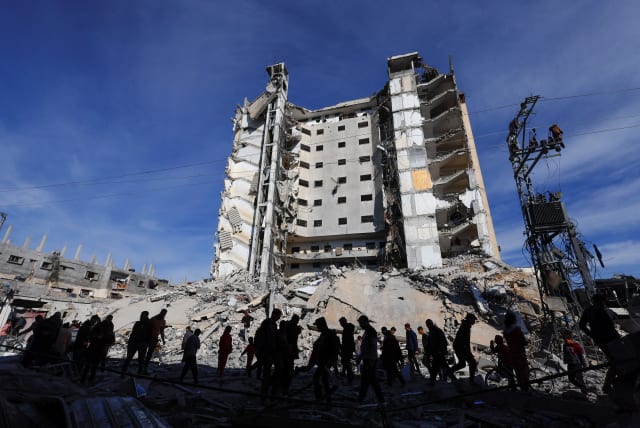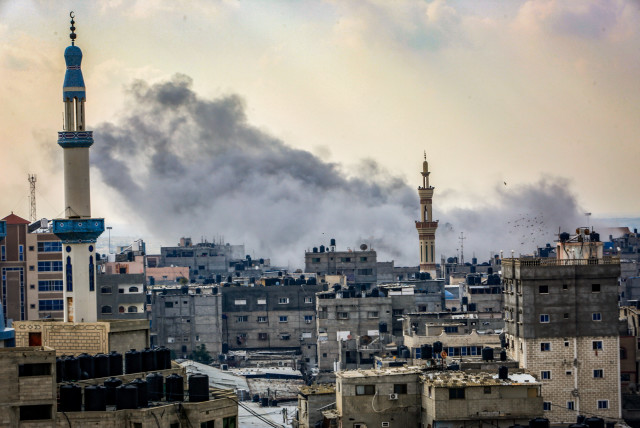US approves Rafah op. in exchange for no Israeli counter-strikes on Iran - report

Israel allegedly obtained approval for an operation in Rafah as long as it doesn't strike Iran, according to Qatari reports.
The US has approved a potential Israeli Rafah operation in exchange for the Jewish state not conducting counterstrikes on Iran, according to a Thursday report from the Qatari newspaper The New Arab.
A senior official told The New Arab that "Prime Minister Benjamin Netanyahu managed to obtain American approval for a military operation in Rafah, in exchange for [Israel] refraining from carrying out a wide military operation against Iran in response to its recent attack."
He claimed that "discourse of an Israeli response to Iran contradicts the desires of the American administration, and is not realistic, given the Israeli claims that the United States played the major role in repelling the Iranian attack and preventing its success."
The source noted that "the IDF carried out airstrikes [overnight on Thursday] on several areas adjacent to the border between the Gaza Strip and Egypt," adding that "the relevant officials in Egypt were notified before the execution of some of these strikes, which came in the Philadelphi axis at a space adjacent to the border with Egypt.
The report comes among public statements from some Israeli officials expressing desire to retaliate against Iran, with a report published by the KAN broadcasting channel claimed that Israel's ambassador to the US, Michael Herzog, stated on Thursday that "Israel will react to Iran, and it won't take years - soon Iran's missiles will be equipped with nuclear warheads."
The Qatar report also noted that Egypt is exemplifying "full readiness and preparedness of [its] forces stationed in northern Sinai, along the 14-kilometer border strip with the Gaza Strip, as part of a plan to deal with the scenario of a ground invasion in Rafah."
Egyptian troops stationed in northern Sinai amid Rafah operation
Speaking about the potential Israeli ground invasion, Egyptian law professor Dr. Ayman Salama stated that any modification in the military situation requires Egypt's approval, "and Israel will not be able to establish buffer zones on the Egyptian-Israeli border or modify the security annex of the peace treaty between the two countries under the pretext of urgent security needs in cases of direct threats."
Egypt holds a critical position amid the ongoing war in Gaza, as it shares borders with the southern Gazan city of Rafah as well as a large border with Israel.
Egyptian military officials have previously claimed that they are "ready for all scenarios" and that Israel needs to properly evacuate the city of Rafah's civilian population before any border crossings are closed.
The State Department responded to this reporting, saying regardless of whether Israel responds to Iran's attack, the US will still not support an invasion of Rafah that does not factor in the one million people seeking refuge there and the region itself continuing to be an important conduit for humanitarian aid and conduit for the safe departure of foreign nationals.
"Any kind of operation into Raffa would require serious planning, and we would seriously oppose anything that is done without factoring in those various pieces when considering how to conduct a military operation into Rafah," Deputy Spokesperson Vedant Patel said on Thursday.
Hannah Sarisohn contributed to this report.
Jerusalem Post Store
`; document.getElementById("linkPremium").innerHTML = cont; var divWithLink = document.getElementById("premium-link"); if (divWithLink !== null && divWithLink !== 'undefined') { divWithLink.style.border = "solid 1px #cb0f3e"; divWithLink.style.textAlign = "center"; divWithLink.style.marginBottom = "15px"; divWithLink.style.marginTop = "15px"; divWithLink.style.width = "100%"; divWithLink.style.backgroundColor = "#122952"; divWithLink.style.color = "#ffffff"; divWithLink.style.lineHeight = "1.5"; } } (function (v, i) { });

